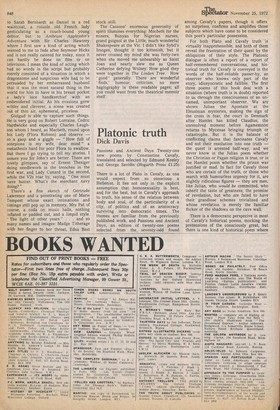Platonic truth
Dick Davis
Passions and Ancient Days Twenty-one new poems by Constantine Cavafy, translated and selected by Edmund Keeley and George Savidis (Hogarth Press £1.25) There is a lot of Plato in Cavafy, as one would expect from so conscious a Hellenist. It lies not only in the explicit assumption that homosexuality is best, and for the best, but in Cavafy's approach to truth, his sense of the relation between body and soul, of the particularity of a city, of politics and of an aristocracy surviving into democratic times. The themes are familiar from the previously published work, and Passions and Ancient Days, an edition of twenty-one poems selected from the seventy-odd found among Cavafy's papers, though it offers no surprises, confirms and amplifies those subjects which have come to be considered this poet's particular possession.
For both Plato and Cavafy truth is virtually inapprehensible, and both of them reveal the frustration of their quest by the obliquities of their style. The Platonic dialogue •is often a report of a report of half-remembered conversations, and historical truth for Cavafy is conveyed in the words of the half-reliable passer-by, an observer who knows only part of the story, idiosyncratic and fallible. The first three poems of this book deal with a situation (where truth is in doubt) reported to us through the consciousness of an unnamed, unimportant observer. We are shown Julian the Apostate at the Eleusinian mysteries, making the sign of the cross in fear, the court in Denmark after Hamlet has killed Claudius, the unresolved moment before Agamemnon returns to Mycenae bringing triumph or catastrophe. But it is the balance of conflicting claims that fascinates Cavafy and not their resolution into one truth — the quest is arrested half-way, and we never know in the Julian poem whether the Christian or Pagan religion is true, or in the Hamlet poem whether the prince was justified or mad. In fact for Cavafy those who are certain of the truth, or those who search with humourless urgency for it, are slightly ridiculous figures — they are men, like Julian, who would be committed, who inherit the taste of greatness, the promise of revelation, but who are fated to have their' grandiose schemes trivialised and whose revelation is merely the familiar flicker of the shadows on the cave wall.
There is a democratic perspecive in most of Cavafy's historical poems, mocking the pretensions of the consciously great, but there is one kind of historical poem where
Cavafy seems to share the Platonic ideal of aristocracy — and that is where he is describing the deaths of historical figures. There are two such poems among this new collection — one about Antony and one about a member of the imperial court in Constantinople who witnesses the last Greek emperor die as the Turks enter the city. In these poems the hero gathers himself in as a preparation for death — he recalls his life from its dissipations and wanderings and attempts as he dies to affirm what he truly is. Here, in a historical context, we find a tone which is analogous to that of the sexual and Personal poems. In the latter poems there is the same sense of the body desiring and becoming soiled by contact with the world, With what is unworthy, and of the soul remaining inviolate. But we should guard against reading a northern European guilt into this division — Cavafy allows the Claims of the body, merely reserving for the soul an undisputed, if often impotently sad, hegemony.
This compound of history and personal desire, of celebrated and regretted lust, of conflicting versions of any and every truth, makes Cavafy the most elusive of poets — In the words of Ritsos, whose poems are Perhaps the best commentary, he is.
himself hidden among his words, throughout history, in his personal masks. distanced, invulnerable . .
When we compare these poems with the Previously published collected edition we notice, I think, that the historical poems here offered are more blurred, and the sexual poems more explicit. In other words it seems that the historical poems were Withheld mainly because their technique seemed to Cavafy unsatisfactory, whereas the sexual poems were unpublished largely because of their subject matter. Whatever the ethics of going against a poet's wishes In this way may 'be, we the readers can only be grateful that these poems have been made available to us, and in such carefully wrought translations.













































 Previous page
Previous page